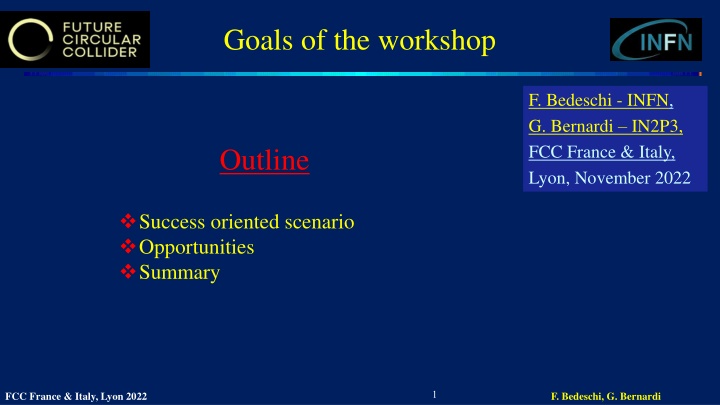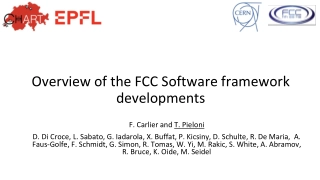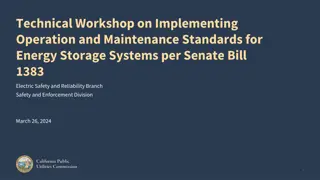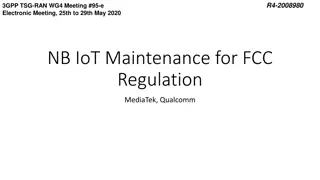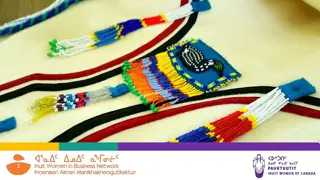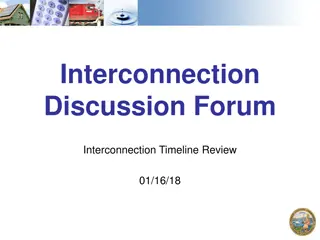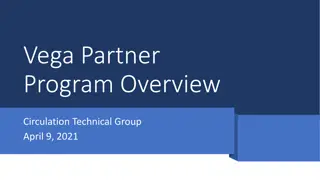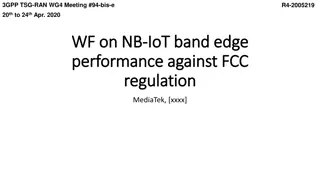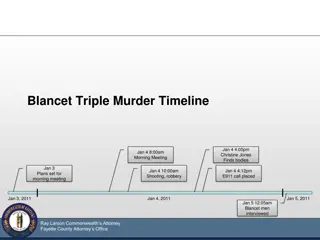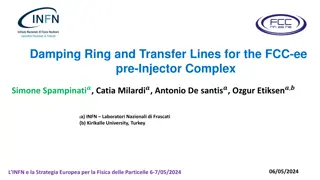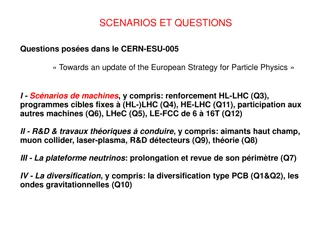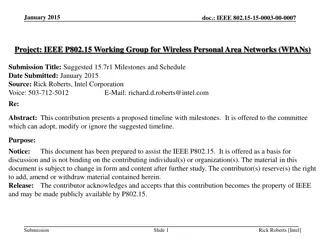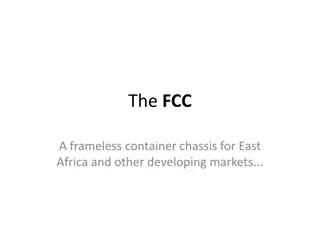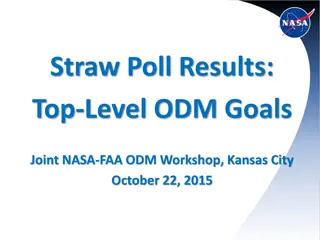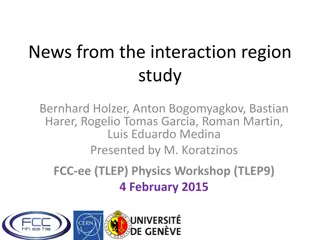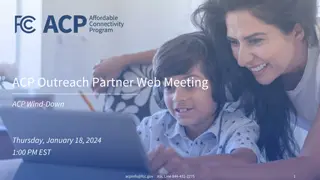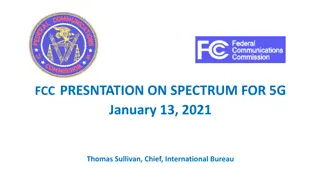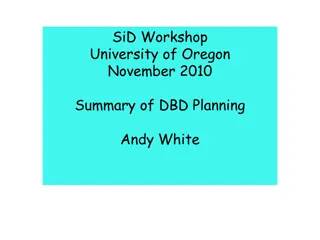Overview of FCC Workshop Goals and Timeline
The workshop held in Lyon, France in November 2022 outlined a success-oriented scenario for the Future Circular Collider (FCC) program in France and Italy. It highlighted opportunities and presented a timeline for the FCC integrated program, including the Feasibility Study, construction phases, and operational plans for FCC-ee and FCC-hh. Discussions covered infrastructure, technical systems, physics experiments, organization, financing, environmental and socio-economic impacts, and accelerator design. The mid-term review and cost review processes were also detailed, emphasizing deliverables for the FCC program.
Download Presentation

Please find below an Image/Link to download the presentation.
The content on the website is provided AS IS for your information and personal use only. It may not be sold, licensed, or shared on other websites without obtaining consent from the author.If you encounter any issues during the download, it is possible that the publisher has removed the file from their server.
You are allowed to download the files provided on this website for personal or commercial use, subject to the condition that they are used lawfully. All files are the property of their respective owners.
The content on the website is provided AS IS for your information and personal use only. It may not be sold, licensed, or shared on other websites without obtaining consent from the author.
E N D
Presentation Transcript
Goals of the workshop F. Bedeschi - INFN, G. Bernardi IN2P3, FCC France & Italy, Lyon, November 2022 Outline Success oriented scenario Opportunities Summary 1 FCC France & Italy, Lyon 2022 F. Bedeschi, G. Bernardi
Timeline of the FCC integrated programme Feasibility Study: 2021-2025 If project approved before end of decade construction can start beginning 2030s FCC-ee operation ~2045-2060 FCC-hh operation 2070-2090++ Gianotti/Benedikt, FCC week. Paris 2022 F. Gianotti FCC Feasibility Study Overview Michael Benedikt Paris, 30 May 2022
Scenario P. Janot, 2021 3 FCC France & Italy, Lyon 2022 F. Bedeschi, G. Bernardi
Mid-Term Review & Cost Review : Autumn 23 (final review 25) Mid-term review report, supported by additional documentation on each deliverable, will be submitted to review committees and to Council as input for the review. Results of both general mid-term review and the cost review should indicate the main directions and areas of attention for the second part of the Feasibility Study Infrastructure & placement - Preferred placement and progress with host states (territorial matters, initial states, dialogue, etc.) - Updated civil engineering design (layout, cost, excavation) - Preparations for site investigations Technical Infrastructure - Requirements on large technical infrastructure systems - System designs, layouts, resource needs, cost estimates Physics, experiments, detectors: - Documentation of FCC-ee and FCC-hh physics cases - Plans for improved theoretical calculations to reduce theoretical uncertainties towards matching FCC-ee statistical precision for the most important measurements. - First documentation of main detector requirements to fully exploit the FCC-ee physics opportunities Organisation and financing: - Overall cost estimate & spending profile for stage 1 project Environmental impact, socio-economic impact: - Initial state analysis, carbon footprint, management of excavated materials, etc. - Socio-economic impact and sustainability studies Accelerator design FCC-ee and FCC-hh - FCC-ee overall layout with injector - Impact of operation sequence: Z, W, ZH, t t vs start at ZH - Comparison of the SPS as pre-booster with a 10-20 GeV linac - Key technologies and status of technology R&D program - FCC-hh overall layout & injection lines from LHC and SC-SPS 4 FCC France & Italy, Lyon 2022 4
PED Deliverables for the FCC mid-term review For the mid-term report expected by fall 2023, three main deliverable categories for PED: Section 1: Physics case (P. Azzi talk this afternoon) Documentation of the specificities and complementarity of the FCC-ee and FCC-hh physics cases, in particular for the Standard Model Higgs boson characterization. Should include the FCC-ee standalone physics case (Council specific request) Should include specificities and complementarity with other colliders (other e+e- Higgs factories, Multi-TeV muon collider) Should extend to topics beyond the SM Higgs boson characterization Carbon footprint during operation (and installation) is explicitly requested Section 2: Theoretical calculations (F. Piccinini talk this afternoon) Strategic plan for improved calculations needed to reduce theoretical uncertainties towards matching the FCC-ee expected statistical precision on the most important measurements. Should include a detailed plan for MC generators as well Section 3: Detector requirements (D. Contardo talk this afternoon) First documentation of the main detector requirements to fully exploit the FCC-ee physics opportunities, in particular to reduce experimental uncertainties towards matching the expected statistical precision on the most important measurements. Should include a complete list of requirements, also those for which we don t have a complete study yet - Accelerator: M. Boscolo talks this afternoon 5 FCC France & Italy, Lyon 2022 5
EU programs AidaInnova: Many funded activities relative to FCC WP 5 Pixel MAPS, WP 7 Gas Detectors, WP 8 Calorimetry WP 10 Cooling for VTX, WP 11 Microelectronics , WP 12 Software ECFA Detector R&D implementation Future DRDs 1-Gaseous, 2-Liquid, 3-Solid state, 4-PID & Photon, 5-Quantum, 6-Calorimetry, 7- Electronics, 8-Integration, 9-Training Process: Community input: ~ end 2022 Written proposals: mid 2023 Review: Fall 2023 Grant agreements: 2024 6 FCC France & Italy, Lyon 2022 F. Bedeschi, G. Bernardi
France & Italy France & Italy among first EU countries supporting FCC Significant involvement for many years France: FCC France days: Nov. 14-15, 2019 3rd FCC France workshop, Annecy Nov. 30 Dec. 2, 2021 Italy: R&D on FCC supported by INFN since 2017 1st FCC Italy workshop, Rome Mar. 21 22, 2022 France/Italy activities mostly disconnected so far This workshop is an important opportunity to develop R&D collaborations on theory, software, accelerator, experiments/detectors Outlook to form FCC detector proto-collaborations by next EU strategy In parallel develop common R&D projects in the context of the ECFA roadmap FCC France & Italy, Lyon 2022 7 F. Bedeschi, G. Bernardi
Detectors under Study for FCC-ee CLD IDEA Noble Liquid ECAL explicitely designed for FCC-ee, recent concept, under development silicon vertex Low X0drift chamber Thin Solenoid before the Calorimeter High Granularity Liquid Argon Calorimetry Several other options, like Crystal Calorimetry (active in US, Italy), are under study (similarly for tracking, muons and particle ID) Potentially 4 experiments, many complementary options will be implemented, Definitely a place to collaborate FCC France & Italy, Lyon 2022 8
Summary workshop goals Describe ongoing activities on both sides Explore potential to cooperate in all areas: theory, software, accelerator, detectors Explore short time scale potential collaboration on: AidaInnova FCC iterms Feasibility Study mid-term report end 2023 Final report end of 2025 Formation of DRD collaborations 2023-24 Explore medium time scale potential collaboration on: FCC detector proto-collaboration/EOI ~2026 FCC detector TDR 2028-30 9 FCC France & Italy, Lyon 2022 F. Bedeschi, G. Bernardi
